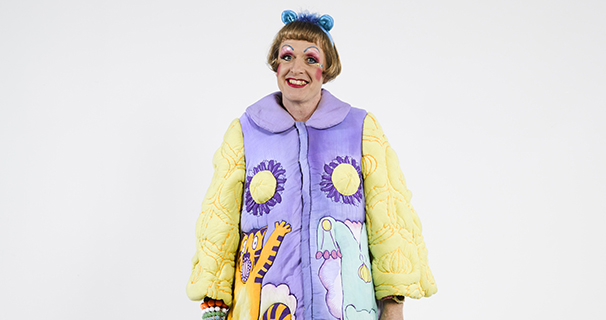Grayson Perry tackles manliness: 'It's inevitable men will feel they're becoming more like women'

The latest updates, reviews and unmissable series to watch and more!
You are now subscribed
Your newsletter sign-up was successful
Want to add more newsletters?

ONCE A WEEK
What to Watch
Get all the latest TV news and movie reviews, streaming recommendations and exclusive interviews sent directly to your inbox each week in a newsletter put together by our experts just for you.

ONCE A WEEK
What to Watch Soapbox
Sign up to our new soap newsletter to get all the latest news, spoilers and gossip from the biggest US soaps sent straight to your inbox… so you never miss a moment of the drama!
We chat to 56-year-old Turner Prize winner, artist Grayson Perry, who’s known for his graphic ceramics and bold textiles, as he explores the essence of masculinity in a three-part documentary, Grayson Perry: All Man (Channel 4, Thursday, May 5).
You’re well-known for your cross-dressing alter ego Claire, complete with multi-coloured frocks, but do you consider yourself masculine?
“Oh hugely! I wouldn’t call myself macho, but I demonstrate many traits I would call masculine.”
Is gender something you think about often?
“I’ve thought about what it means to be a man in Britain today a lot over the past year. While filming the documentary, I’ve met men who either epitomise or struggle with ideas of manliness – from cops and criminals to cage fighters and bankers – and at the end of each episode, I produce works of art inspired by them.
“As a transvestite, the subject of gender has been thrust upon me through circumstance. I thought about gender a lot growing up. It’s such a big topic and it plays a part in every moment of our lives.”
In the first episode, you tackle masculinity’s buzzwords – machismo, aggression, violence. Tell us a bit about that...
The latest updates, reviews and unmissable series to watch and more!
“I travel to the North East to meet some tough-looking cage fighters. Some of these guys fight to get that anger out of their system. But having been an angry young man myself, who’s had a lot of therapy, I don’t think just punching someone necessarily rids you of your demons.
"I call myself a ‘lifelong sissy’ and worry that the need to be hard is having a devastating effect, especially when statistics tell us that suicide is the biggest killer of men under 45 in Britain, and the highest number is in the North East."
Why do you think that is?
“Men don’t talk about what’s going on with them. They don’t want to show weakness because it’s not in their ‘manscript’. There’s a huge gap between the sort of man they think they ought to be and the man they actually are.”
Have any of your TV series, including Bafta winners All in the Best Possible Taste (2012) and Who Are You? (2014), helped you to confront some of your own personal prejudices?
“This particular series has. I’ve always been proactive about dealing with my issues, and being married to a psychotherapist, I’m not allowed to get along without an issue for very long.
“Making this series has been interesting, though, because while I can be very sympathetic to the plight of men, I also get really depressed by it. What men need to realise is that half the victims of masculinity are, in fact, male.”
Do you think men are becoming more like women?
‘Going forward, the idea of 'man' is a more complicated, nuanced, subtle and changing picture and, yes, it’s inevitable that it will feel as though men are becoming more like women, but that might not be a bad thing…’

